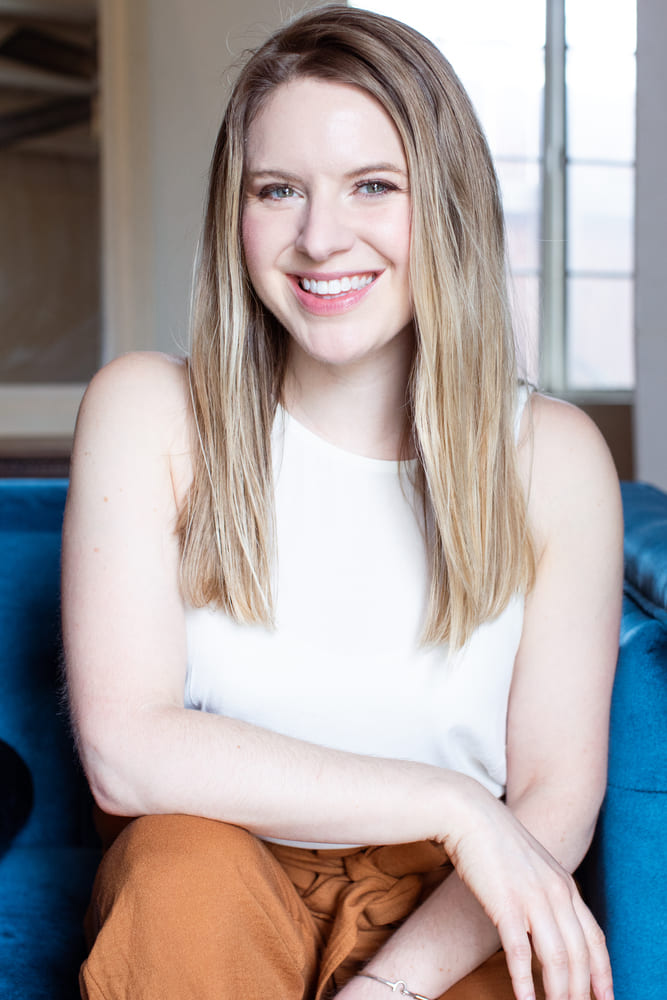December 1, 2021
Cracking Perfectionism with Kimberly Irving: Asking The Right Questions to Define Success for Yourself and Avoid Burnout
By Emily Merrell
Creating hundreds of new connections per year has taught me so many things. But one stands out in particular. The biggest problem that female entrepreneurs struggle with is perfectionism – very closely related to burnout. Kimberly Irving struggled with this herself, but now she’s in the business of helping other entrepreneurs understand their stress, define what success means to them and ultimately help them hit their life and business goals. Read on to learn the mechanisms of stress according to Kimberly, and her advice to hack them.

SDS: While so many of our high achieving peers would consider themselves perfectionists they are struggling with overwhelm. How do you help your clients break free from these cycles?
KIMBERLY IRVING: For starters, it takes a top-down AND bottom-up approach. This refers to the mind-body connection. You can’t just think your way out of things, no matter how strong your mindset game is. If you’re in a high stress response, your body doesn’t give a sh*t about logic or affirmations.
So you have to be able to tend to the nervous system first before the critical thinking and solution-oriented part of your brain can come back online. This can look like vigorous exercise, yoga, breathing exercises, or other simple grounding techniques that help you come back to safety in your body. You’ll know you’re there when your breathing is steadier, your body feels alert but relaxed, and your mind is calmer and clearer.
Alternatively, some people are really good about doing all the meditation, exercise, and embodiment stuff, but they are oblivious to the unconscious thoughts that are wreaking havoc and keeping them stuck playing defense all the time. In other words, they constantly feel the need to counteract their stress/anxiety/overwhelm, rather than getting to the root thoughts and beliefs that are causing the stress response to begin with.
This can look like a lot of “should” statements, all or nothing thinking, perfectionism, and a tough inner critic (many of my clients hold themselves to pretty high standards, thinking this is what has led to their success so far, but it’s actually holding them back).
When it comes to cracking perfectionism, that takes a deeper level of belief and identity work and a desire for freedom that’s stronger than the desire to be perceived a particular way. The irony is, this not only leads to more success but also deeper fulfillment.
SDS: What was your “aha” moment that led you to become a women’s life, leadership and success coach? What were you doing pre-coaching?
KI: Man, I don’t know if there ever was any one particular moment…it felt more like a gradual unfolding of purpose and truth. I suppose the perhaps uninteresting answer is that I decided I wanted to transition into coaching, and so sat down and thought about all the different problems I know how to solve and what I enjoy doing the most. It’s continued to evolve and be refined from there! It also has stemmed from a lot of the challenges I have overcome in my own life: severe anxiety, depression, eating disorders, and learning how to effectively manage life as an empathetic and highly sensitive person.
Pre-coaching, I have had a few different lives. Immediately before becoming a coach, I was a hospital social worker and had a part-time private therapy practice. Before that, I was working in TV/film production!
SDS: What does success look like for you? How has it evolved in your life?
KI: I have come to define success more by how in alignment I feel and how much I am pushing my own personal edges than anything else:
Am I growing?
Am I creating an impact?
Am I happy?
Am I present?
Am I taking care of myself?
Do I feel joy on a regular basis?
This is what matters most to me. Of course, I desire to be financially successful as well, but I believe any financial success worth having does not exist without those prerequisites.
My perception of success has evolved a lot over the years. I went from being a very high achieving child to developing a serious eating disorder, which I believe made me a bit afraid of my drive and perfectionism. This was later followed by various mental health diagnoses, which shifted my identity dramatically – I began to see myself as “broken,” incapable, and went through many dark years. Success to me then was something “other people” could have, but not me.
I really turned things around though. I went back to an elite university for my Master of Social Work degree, with a perfect GPA. Also, I ran a leadership organization, became a research assistant, and got an amazing job right out of school. That was a huge triumph for me given where I had come from. It almost makes me laugh now of how drastic a transformation that was for me, and even more so with where I’m at now – running my own successful business.
SDS: How can a “life of ease” transform someone’s life? What are some of the biggest transformations you’ve seen with your clients?
KI: Stress doesn’t change what you have to do, just how you feel doing it. When you have stress compound over time, it literally affects everything. Your mental, emotional, physical, and spiritual health, your relationships, your career….literally, nothing is untouched. Everything is harder than it has to be.
Imagine what it’s like swimming upriver to get to a destination. You’re probably huffing and puffing, choking on water, fighting a stomach cramp, and getting really frustrated and discouraged, not to mention exhausted.
Now imagine flowing WITH the river to your destination. You’re feeling buoyant and light, maybe enjoying the way the sunshine is hitting the leaves in the trees. Your breath is calm, your emotional state relaxed and steady… And you get to your destination at least 3x as fast compared to swimming upstream. This is what ease does. It conserves energy, saves you time, and allows you to enjoy the journey.
One of my clients – a classic perfectionistic high-achiever, accustomed to a lot of “pushing” and “driving” energy – gave herself permission to forget her to-do list. Instead, she allowed herself to put on her favorite comfy clothes, ate peanut butter straight out of the jar, then curled up on the couch and read a book. A few hours later, out of the blue, she genuinely felt inspired to work again. She utterly shocked herself when she accomplished in 45 minutes what she blocked out 6 hours for. This is the power of ease and flow.
I would also be remiss if I did not mention that this same client had been struggling with multiple burnouts in her business, severe anxiety, and chronic pain. And within the first two weeks of us working together, the anxiety and chronic pain were almost non-existent. The burnout cycle is broken. She is now thriving in her business and has multiple streams of income.

SDS: Have you ever experienced burnout yourself? How did you overcome it and what is something you wish you had known before that point?
KI: I haven’t hit a full-blown burnout in the traditional sense, thank god. I think once you’ve come close to dying from an eating disorder, you develop a certain respect for the body’s limits. But I’ve teetered dangerously close a couple of times. The best advice I can give is:
– Take preventative action before it seems like it’s necessary.
– Signs to look out for: Feeling “tired and wired” like you can’t shut off, feeling resentful, increased anxiety, changes in your mood, more frequent crying, changes in sleep, increased irritability, loss of enjoyment in things you used to enjoy, inability to be mentally present with family/friends.
– Practice setting boundaries and saying “no” more often.
– Be willing to temporarily adjust your standards and expectations to the bare minimum and essential tasks until you are back to a more balanced nervous system state.
– Don’t forget to drink water and take non-working lunch breaks. If needed, set an alarm in order to remind yourself.
– Spend 30 minutes a day helping your body complete the stress cycle: exercise, embodied movement, channeling your feelings into art or music, sex followed by at least 6 mins of cuddling. This might seem like an inconvenient time commitment at first but you know what’s more inconvenient? Having to take 3-12 months off to recover from burnout.
– Consider working with a coach or mentor to provide you added support, accountability, and most importantly, tools and strategies to break free from these patterns for good
SDS: We believe in the power of community and manifestation, who is your dream connection and why?
KI: I’m obsessed with Simone Grace Seoul. I think she is one of the most brilliant minds and loving souls in the coaching space right now. Of course, it helps that she speaks openly about dealing with anxiety, depression, being a highly sensitive person (as I am), among other “neuro-diverse” traits. I think it’s so important to have mentors and expanders who have risen above similar challenges as us so we can remind our brain of what’s possible. She’s been doing that for me in big ways lately and I just adore her.

